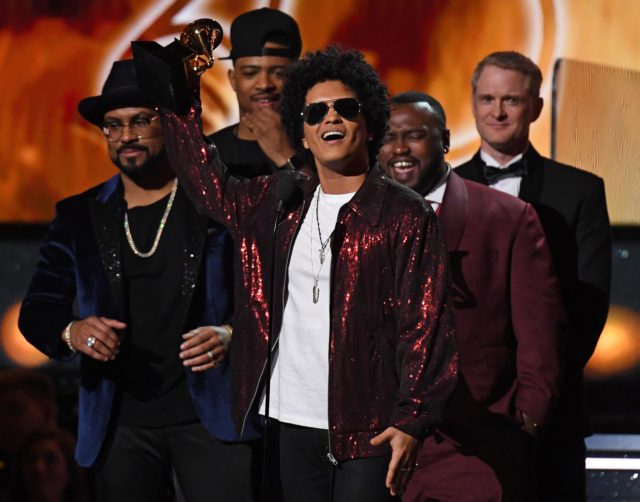Viral clip stirs up cultural appropriation debate around Bruno Mars
Bruno Mars receives his third Grammy for Album of the Year during the 60th Annual Grammy Awards show on January 28, 2018, in New York. / AFP PHOTO / Timothy A. CLARY
After clip from an episode of The Grapevine, a YouTube channel that describes itself as “a fresh and innovative take on panel style discussion,” went viral in the beginning of March, a debate has surfaced around artist Bruno Mars and his role in cultural appropriation.
The Grapevine is made up of “young game changers, artists, cultural innovators, and professionals” who discuss topics in today’s current events and pop culture. The clip that got around 3 million views is from an episode titled “Is Bruno Mars a Cultural Appropriator?”
In the two-minute clip, activist Seren Sensei took a stance against Mars, stating that he “is 100% a cultural appropriator” and that “he plays up his racial ambiguity” by incorporating a fusion of “black genres” in his current music style. In the full video, others echoed Sensei’s opinions saying that it’s unfair that Mars, who is not black, won the Album of the Year Grammy against a majority of black nominees and is praised for singing black music.
The overall issue is that “we want our black culture from non-black bodies,” said Sensei, and Mars is a contributor to that.
While some agreed with Sensei, many disagreed or didn’t understand where she was coming from. Jeff J., another participator in the panel, defined cultural appropriation as having malice or the intention to rape the culture for individual interest, but “Mars is just paying homage to people who came before him.”
Many other black celebrities have to come to Mars’ defense as well as the youth who see Mars as a talented artist. Senior Sandy Park shares her thoughts on the accusations stating that “the people who say he’s a cultural appropriator are being racists themselves. They’re basically saying that only black people can sing black music.”
Mars has not yet responded to this debate, but in an interview for the February issue of Latina Magazine, he discussed the impact black music has had on his music career.
Mars said, “When you say ‘black music,’ understand that you are talking about rock, jazz, R&B, reggae, funk, doo-wop, hip-hop, and Motown. Black people created it all. Being Puerto Rican, even salsa music stems back to the Motherland.” He continued to share his respect for black music and the black artists that has influenced him, including Whitney Houston, Boys II Men, and New Edition.
Overall, the issue has proven to be far more complex than the individual perspectives that have been presented. When it comes to appropriation, everyone has different definitions of what that really looks like. What some see as appropriation, others see as appreciation and vice versa.

Aloha! My name is Catherine Jara, I’m a senior, and this is my first year on the Ka Mō‘ī staff. Last year, I was the club section editor on the Ka Na‘i Aupuni staff, but I switched over to newspaper because I wanted to step outside of my comfort zone and explore more of my writing skills. However, yearbook gave me a lot of good design and communication skills, so I have a unique experience with publications.
Currently, my goal is to major in International Relations, because a program I went to this past summer sparked my passion for culture and global studies. Although I’m not planning to major in Journalism, I feel like the skills I gain from newspaper, such as being able to conduct an interview and strategically communicate my ideas, will be useful for the direction I want to go in. I’m also involved in National Honors Society, KEY Club, and Dog & Cat Huggers.


